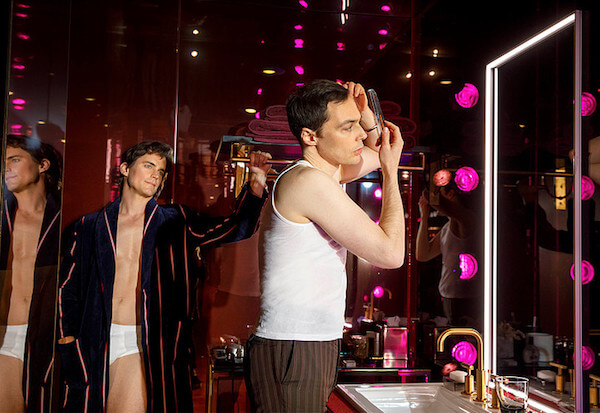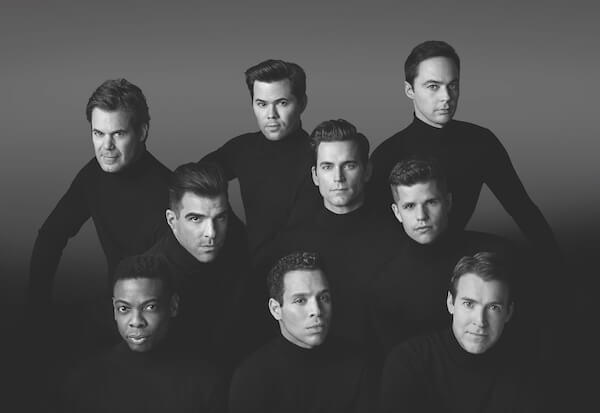Matt Bomer and John Carroll Lynch in Timothy McNeil’s “Anything.” | PALADIN
The modest queer love story, “Anything,” written and directed by Timothy McNeil and based on his play, packs far too much drama into its 93 minutes. It would almost work better as a TV series or a miniseries (like “Tales of the City,” which it somewhat resembles), where its potentially interesting characters could be better developed.
The film opens in Crane, Mississippi, where Early Landry (John Carroll Lynch) is grieving over the death of his wife. After he tries to commit suicide, Early’s sister, Laurette (Maura Tierney), takes him to Los Angeles to live with her. Early soon decides to move away from the controlling Laurette and rents an apartment in Hollywood. The building is full of troubled characters, including his neighbor across the hall, Freda Von Rhenburg (Matt Bomer), a transgender sex worker.
“Anything” starts going off the rails as soon as Freda sashays into the picture. It is not just because Bomer, with his effeminate voice, heavy lipstick, and slinky dresses, is awkward and unconvincing as Early’s love interest. The character is all stereotype. Freda wears garish animal print clothes and throws shade with other Santa Monica Boulevard sex workers. She talks big and dreams bigger, but copes with her despair by popping pills. One night, after Frieda is jumped, Early tends to her, cementing a friendship. They grow closer as Early reads letters from his late wife to Freda and describes the stars in the sky to her. Freda, meanwhile, tries to pull Early out of his funk.
Out gay actor is unconvincing as a trans woman in “Anything”
The relationship that develops between this odd couple feels absolutely synthetic. As the bond between them slowly becomes love, it is hard to care about them or see why they care about each other. Early may accept Freda for who she is, but the only honest moment between them is when Freda tells Early to “reinvent” himself. Mostly, their banter feels forced, especially when Freda peppers her speech with the expected sassy retorts, few of which land well. When a kiss finally happens, it lacks genuine passion.
The sequence where Early spends a night helping Freda quit the pills she is addicted to is particularly cringe-inducing, as Lynch and Bomer fight and cuddle in inauthentic, even manipulative moments. And when Early confesses to Freda the circumstances surrounding his wife’s death, it is meant to be powerful but ends up feeling strained.
This torpid film really hits its nadir when Early invites Laurette, her wheelchair-bound husband Ted (Christopher Thornton), and their teenage son, Jack (Tanner Buchanan) over for dinner to meet Freda, not informing them ahead of time that she is trans. As an intolerant Laurette calls out the elephant in the room, the scene is awkward for both the characters and the audience. Hurt feelings and shaming take the place of any constructive resolution, and Laurette remains the villain because this love story needs conflict. The resulting split between Early and Freda is what makes them recognize how much they really mean to each other. The film’s message about the healing power of love is presented clumsily, to be charitable.
As flawed as McNeil’s film is, Lynch makes Early’s grief palpable. Lynch conveys this effortlessly with his perpetual hangdog expression and resigned body language. He is the only reason to see “Anything.”
In contrast, Bomer’s performance is simply distracting. The actor never disappears into the role; he just seems to be doing phony play-acting. Even if the out gay actor is up for the challenge of playing trans, viewers might prefer to imagine what a trans actress would do with the part.
“Anything” never achieves the humanity of the recent Oscar-winning film “A Fantastic Woman,” which depicted a similar relationship between an older man and a trans woman with dignity. McNeil’s film might be ambitious, but it is not very good.
ANYTHING | Directed by Timothy McNeil | Paladin | Opens May 11 | Landmark at 57 West, 657 W. 57th St. | landmarktheatres.com
































